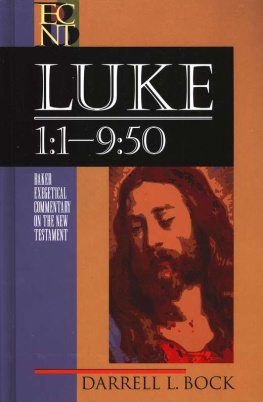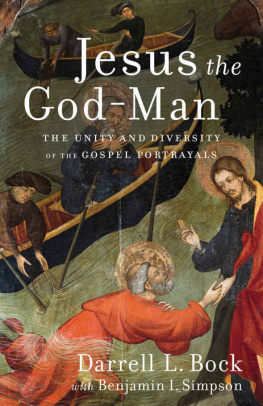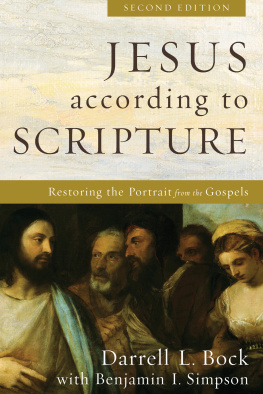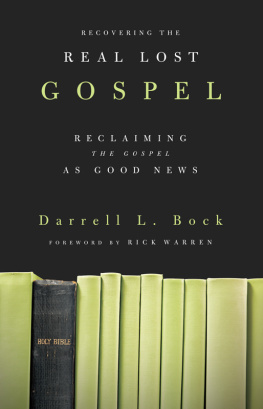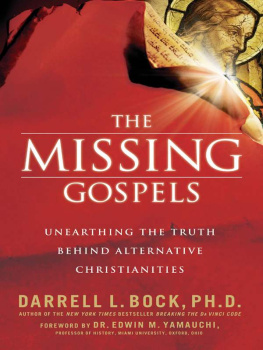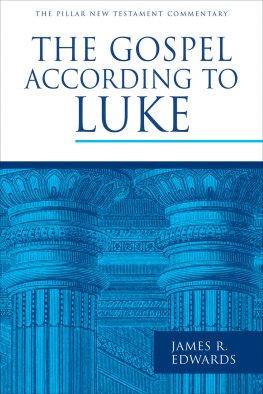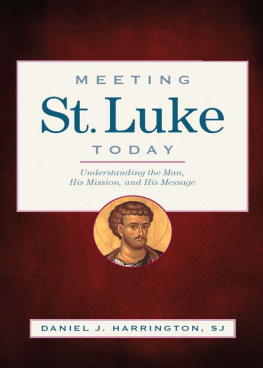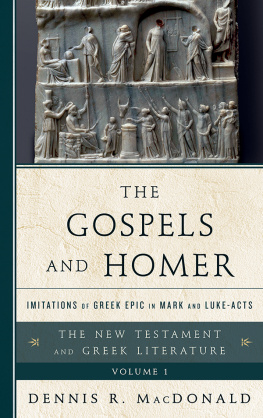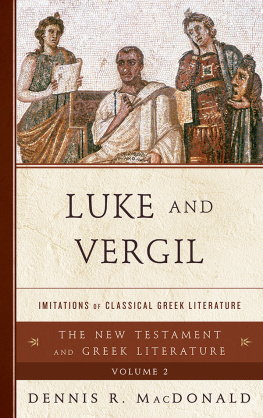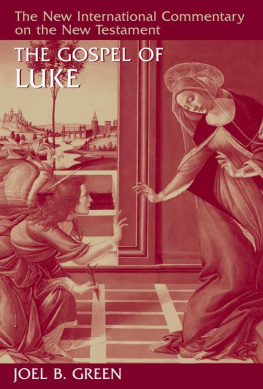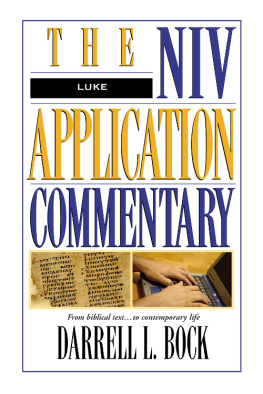Darrell L. Bock - Luke 1:1-9:50
Here you can read online Darrell L. Bock - Luke 1:1-9:50 full text of the book (entire story) in english for free. Download pdf and epub, get meaning, cover and reviews about this ebook. year: 1994, publisher: Baker Academic, genre: Religion. Description of the work, (preface) as well as reviews are available. Best literature library LitArk.com created for fans of good reading and offers a wide selection of genres:
Romance novel
Science fiction
Adventure
Detective
Science
History
Home and family
Prose
Art
Politics
Computer
Non-fiction
Religion
Business
Children
Humor
Choose a favorite category and find really read worthwhile books. Enjoy immersion in the world of imagination, feel the emotions of the characters or learn something new for yourself, make an fascinating discovery.
- Book:Luke 1:1-9:50
- Author:
- Publisher:Baker Academic
- Genre:
- Year:1994
- Rating:3 / 5
- Favourites:Add to favourites
- Your mark:
- 60
- 1
- 2
- 3
- 4
- 5
Luke 1:1-9:50: summary, description and annotation
We offer to read an annotation, description, summary or preface (depends on what the author of the book "Luke 1:1-9:50" wrote himself). If you haven't found the necessary information about the book — write in the comments, we will try to find it.
Luke 1:1-9:50 — read online for free the complete book (whole text) full work
Below is the text of the book, divided by pages. System saving the place of the last page read, allows you to conveniently read the book "Luke 1:1-9:50" online for free, without having to search again every time where you left off. Put a bookmark, and you can go to the page where you finished reading at any time.
Font size:
Interval:
Bookmark:
LUKE
VOLUME 1:
1:19:50
DARRELL L. BOCK

Baker Exegetical Commentary on the NewTestament

1994by Darrell L. Bock
Published by Baker Academic
a division of BakerPublishing Group
P.O. Box 6287, GrandRapids, Michigan 495166287
www.bakeracademic.com
Fifth printing, December 2004
All rights reserved. No part of this publication may be reproduced,stored in a retrieval system, or transmitted in any form or by any meansforexample, electronic, photocopy, recordingwithout the prior written permissionof the publisher. The only exception is brief quotations in printed reviews.
Library of Congress Cataloging-in-PublicationData
Bock, Darrell L.
Luke / Darrell L. Bock.
p. cm. (Baker exegetical commentary on the New Testament ;3A)
Includes bibliographical references and indexes.
ISBN 08010-10535 (v. 1)
1. Bible. N.T. LukeCommentaries. I. Title. II. Series.
BS2595.3.B58 1994
226.4077dc20 9433507
With Appreciation
Dave Krentel
William D. Taylor
Harold Hoehner
Don Glenn
Elliott Johnson
Eugene Merrill
Ken Barker
Ed Blum
Stan Toussaint
Howard Hendricks
Don Campbell
I. Howard Marshall
M. Daniel Carroll R.
Scott B. Rae
Craig A. Blaising
It has been a privilege to learn so much fromyou,
and a joy to know the Lords fellowship and
share in the Lords work with you.
Contents
SeriesPreface
AuthorsPreface
Abbreviations
Transliteration
Introduction to the Gospel of Luke
I. LukesPreface and the Introduction of John and Jesus (1:12:52)
A. Preface:Luke Carefully Builds on Precedent (1:14)
B. InfancyNarrative: Forerunner and Fulfillment (1:52:40)
C. JesusRevelation of His Self-Understanding (2:4152)
II. Preparationfor Ministry: Anointed by God (3:14:13)
A. Johnthe Baptist: One Who Goes Before (3:120)
B. Jesus:One Who Comes After (3:214:13)
III. GalileanMinistry: Revelation of Jesus (4:149:50)
A. Overviewof Jesus Ministry (4:1444)
B. Gatheringof Disciples (5:16:16)
C. JesusTeaching (6:1749)
D. FirstMovements to Faith and Christological Questions (7:18:3)
E. Callto Faith, Christological Revelation, and Questions (8:49:17)
F. ChristologicalConfession and Instruction about Discipleship (9:1850)
Excursuses
1. Johnthe Baptist and Elijah (1:17)
2. TheCensus of Quirinius (2:12)
3. Dateof John the Baptists Ministry (3:12)
4. Sourcesand Synoptic Relationships
5. TheGenealogies of Matthew and Luke (3:2338)
6. TheSon of Man in Aramaic and in Luke (5:24)
p viii The Sermon on the Plain in Luke: Its Relationship to Matthew and ItsTheological-Ethical Function (6:2049)
8. TheParables of Jesus
9. LukesGreat Omission (9:18) from Mark 6:458:26
10. Authenticityof the Suffering-Son-of-Man Sayings and of the Passion Predictions (9:22)
ProvisionalBibliography
Indexof Subjects
Indexof Authors
Indexof Greek Words
Indexof Scripture and Other Ancient Writings
Old Testament Pseudepigrapha
New Testament Apocrypha
Mishnah
Tosepta
Babylonian Talmud
Jerusalem (Palestinian) Talmud
Targumim
Midrashim
Other Rabbinic Writings
Qumran / Dead Sea Scrolls
Papyri
Josephus
Philo
Classical Writers
Church Fathers
Miscellanea
Maps 50,277, 388
The chief concern of the Baker Exegetical Commentary on the NewTestament (to be known as BECNT) is to provide, within the framework of informedevangelical thought, commentaries that blend scholarly depth with readability,exegetical detail with sensitivity to the whole, attention to critical problemswith theological awareness. We hope thereby to attract the interest of a fairlywide audience, from the scholar who is looking for a thoughtful and independentexamination of the text to the motivated lay Christian who craves solid butaccessible exposition.
Nevertheless, a majorpurpose is to address the needs of pastors and others who are involved in thepreaching and exposition of the Scriptures as the uniquely inspired Word ofGod. This consideration affects directly the parameters of the series. Forexample, serious biblical expositors cannot afford to depend on a superficialtreatment that avoids the difficult questions, but neither are they interestedin encyclopedic commentaries that seek to cover every conceivable issue thatmay arise. Our aim, therefore, is to focus on those problems that have a directbearing on the meaning of the text (although selected technical details aretreated in the additional notes).
Similarly, a special effort is made to avoid treating exegeticalquestions for their own sake, that is, in relative isolation from the thrust ofthe argument as a whole. This effort may involve (at the discretion of theindividual contributors) abandoning the verse-by-verse approach in favor of anexposition that focuses on the paragraph as the main unit of thought. In allcases, however, the commentaries will stress the development of the argumentand explicitly relate each passage to what precedes and follows it so as toidentify its function in context as clearly as possible.
We believe, moreover,that a responsible exegetical commentary must take fully into account thelatest scholarly research, regardless of its source. The attempt to do this inthe context of a conservative theological tradition presents certainchallenges, and in the past the results have not always been commendable. Insome cases, evangelicals appear to make use of critical scholarship not for thepurpose of genuine interaction but only to dismiss it. In other cases, theinteraction glides over into assimilation, theological distinctives are ignoredor suppressed, and the end product cannot be differentiated from works that arise from afundamentally different starting point.
The contributors to this series attempt to avoid these two pitfalls.They do not consider traditional opinions to be sacrosanct, and they arecertainly committed to do justice to the biblical text whether or not itsupports such opinions. On the other hand, they will not quickly abandon along-standing view, if there is persuasive evidence in its favor, for the sakeof fashionable theories. What is more important, the contributors share a beliefin the trustworthiness and essential unity of Scripture. They also considerthat the historic formulations of Christian doctrine, such as the ecumenicalcreeds and many of the documents originating in the sixteenth-centuryReformation, arose from a legitimate reading of Scripture, thus providing aproper framework for its further interpretation. No doubt, the use of such astarting point sometimes results in the imposition of a foreign construct onthe text, but we deny that it must necessarily do so or that the writers whoclaim to approach the text without prejudices are invulnerable to the samedanger.
Accordingly, we do not consider theological assumptionsfrom which, inany case, no commentator is freeto be obstacles to biblical interpretation. Onthe contrary, an exegete who hopes to understand the apostle Paul in atheological vacuum might just as easily try to interpret Aristotle withoutregard for the philosophical framework of his whole work or without havingrecourse to those subsequent philosophical categories that make possible ameaningful contextualization of his thought. It must be emphasized, however,that the contributors to the present series come from a variety of theologicaltraditions and that they do not all have identical views with regard to theproper implementation of these general principles. In the end, all that reallymatters is whether the series succeeds in representing the original textaccurately, clearly, and meaningfully to the contemporary reader.
Font size:
Interval:
Bookmark:
Similar books «Luke 1:1-9:50»
Look at similar books to Luke 1:1-9:50. We have selected literature similar in name and meaning in the hope of providing readers with more options to find new, interesting, not yet read works.
Discussion, reviews of the book Luke 1:1-9:50 and just readers' own opinions. Leave your comments, write what you think about the work, its meaning or the main characters. Specify what exactly you liked and what you didn't like, and why you think so.

